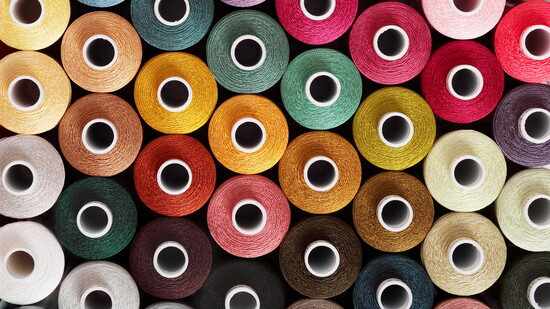In the same way that a meticulously-crafted article of clothing begins with just a needle and a thread, Dr. Lance Cheramie’s decades-long career in the fashion industry started merely with an intention. Cheramie, who serves as a teaching assistant professor in the University of Arkansas’ School of Human Environmental Sciences and an affiliate member of the University’s Environmental Resilience program, said that he recognized from a young age that fashion was more than just a form of personal expression; it was also a vehicle for storytelling—with each color chosen or texture added, clothing is used to communicate with the world around it. This understanding stayed with him into adulthood, leading him into a career in retail management and merchandise buying.
Cheramie’s career path eventually relocated him to Fayetteville, where he took on a role as a merchandise buyer for the University of Arkansas, Razorbacks. Cheramie’s cumulative experiences introduced him to broader systems within the fashion and retail industries, including how apparel was developed, sourced and entered into markets. “I was especially drawn to the intersection of fashion and responsibility, which led me deeper into topics like sustainability, ethics and public policy,” Cheramie said. His interests would lead him to a new facet of the fashion industry: teaching others. “I discovered that the most fulfilling part [of the industry] was mentoring young professionals. That realization inspired me to pursue a career in higher education, where I could share my industry knowledge while helping students navigate the evolving fashion landscape,” he continued.
Cheramie’s teaching career coincided with his graduate-level studies at the university, where he received his doctorate in public policy with an emphasis on sustainability and environmental policy in the apparel and textile industry. Now, Cheramie is integrating his career experiences with his higher education. In fact, Cheramie developed university-wide courses focused on sustainability in the fashion industry. ”I have the opportunity to blend real-world experience with academic insight, guiding students as they explore fashion as a global, dynamic, and impactful field. My goal is to prepare them not just for careers, but to become thoughtful, informed leaders who engage the industry with curiosity, creativity and conscience,” he said.
Cheramie’s specialty in sustainability in fashion isn’t just a personal interest; it’s an essential aspect of the industry. He said that the fashion industry is one of the world’s largest polluters due in part to factors like water depletion, carbon emissions and textile waste. “If fashion is to remain a force for creativity and cultural expression, we must take that responsibility for how it’s made, consumed and discarded. That means rethinking the entire lifecycle of a product, from fiber to finish and beyond,” he said.
The improvement of the fashion industry is not confined to university programs and large-scale fashion brands, Cheramie said. In fact, Fayetteville is in a unique position to bring a city-sized level of change. “As a university town, we have an engaged student body, a vibrant community of local artisans and vintage retailers, and a culture that already values environmental stewardship…Fayetteville can serve as a model for how small cities can make a big impact,” he explained.
Whether you're a student studying the fashion industry or a Fayetteville citizen pursuing a hobby, Cheramie said that it's all hands on deck to make the fashion industry more environmentally friendly. It only takes one person to make a difference—each sustainable practice can go a long way. At the end of the day, the core of Cheramie’s advice is to stay informed and to use creativity with intention. “I encourage you to align your work with your values, engage in meaningful conversations, and to use your platforms—digital or physical, to spark dialogue and drive progress."
“Fayetteville can serve as a model for how small cities can make a big impact.”
”I have the opportunity to blend real-world experience with academic insight, guiding students as they explore fashion as a global, dynamic, and impactful field. My goal is to prepare them not just for careers, but to become thoughtful, informed leaders who engage the industry with curiosity, creativity and conscience,” - Cheramie
